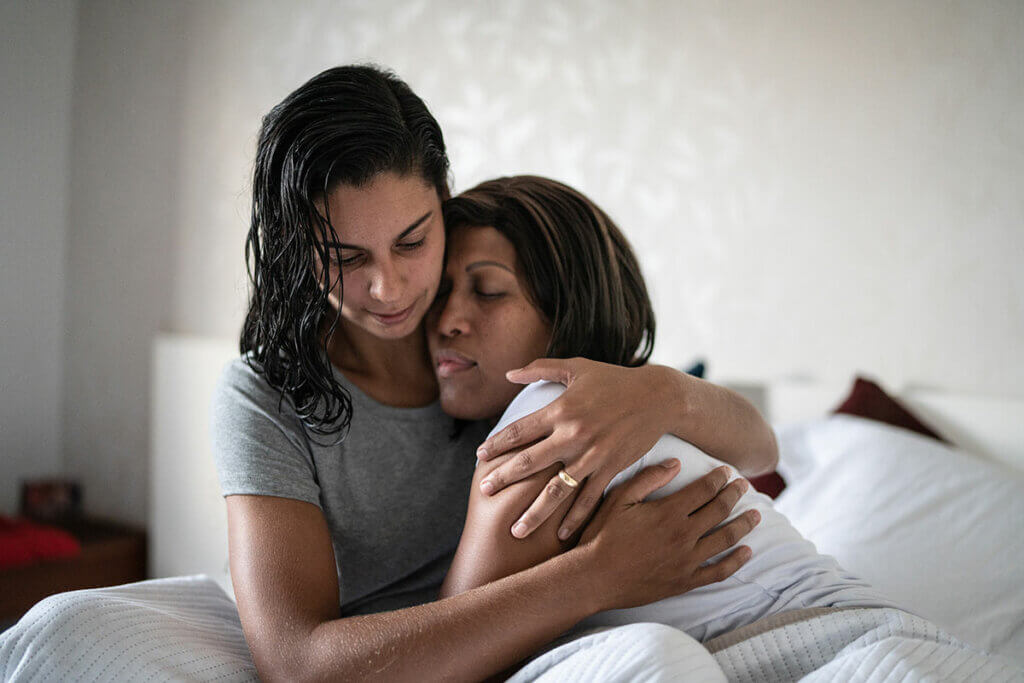How to cope with miscarriage grief
Losing a baby during pregnancy can be emotionally and physically traumatic. If you or someone you love has had a miscarriage, here are some expert strategies to help process the loss and cope with miscarriage grief.

As many as 10% to 20% of pregnancies end in miscarriage. So if you’ve gone through a miscarriage, you’re far from alone. But many people don’t tell anyone about their loss. It can leave them feeling isolated and unsupported.
The grief from a miscarriage can also be confusing to process. It comes with a range of emotions: shock, guilt, anxiety, anger, and sadness among them. You and your partner may have a tough time knowing how to cope with the loss. And your family and friends may not be sure how to support you.
“People relate to babies in utero in different ways,” says Rachael Benjamin. Benjamin is a licensed clinical social worker with Tribeca Therapy and Tribeca Maternity in Brooklyn, New York. “Whatever relationship you created with this pregnancy is the relationship you’re grieving.”
And whatever your feelings, it’s important to be kind to yourself as you grieve. Here are some expert suggestions for how to cope with miscarriage grief.
Give yourself the space you need
No matter how far along the pregnancy was or who knew about it, give yourself permission and time to grieve your loss.
“You lost a pregnancy. That’s a lot to work through,” Benjamin says. “You need to grieve through those losses. Reflect how you’re changed and how to integrate that story into your life. If we don’t process that loss, it’s there whether we like it or not.” Practicing a ritual, such as writing a letter to your unborn child, can help, Benjamin says.
Don’t blame yourself
Logically, you may know that a miscarriage isn’t your fault. Most pregnancy loss is due to things beyond our control. Genetics, uterus abnormalities, infections, or metabolic disorders are all possible causes. But it can be easy to blame yourself anyway.
Know that you’re “trying to find a reason for something you can’t,” Benjamin says. And blaming yourself can get in the way of your ability to grieve. It keeps you stuck in a rationalizing state instead of accepting that you’ve had a loss, Benjamin says.
Think about your hormones
After miscarrying, your body doesn’t go right back to its pre-pregnancy state. In some cases, it can take weeks for pregnancy hormones to drop back to zero. That doesn’t mean your hormones are solely to blame for your emotions. But they do play a role. So keep in mind that they can make painful emotions even more powerful.
Connect with your partner
As soon as possible, sit down with your partner (if you have one) or others who are close to your pregnancy to talk about your loss, Benjamin says. Don’t be surprised if you have different feelings about your loss. Extreme sadness, anger, guilt, anxiety, and irritability are all common symptoms of grief. It’s good to acknowledge feelings on both sides. “We want to be aware about it so it doesn’t live outside the relationship or become the thing that’s not spoken about,” Benjamin says.
Talk to others who’ve been there
Talking to someone who has also been through a miscarriage and knows how you feel can be a relief. “It can make you feel seen, known, and that you’re not making this up,” Benjamin says. There’s a good chance you know someone who has had a miscarriage. Or look for a local or an online support group. Some national organizations that offer miscarriage support include:
You can also ask your primary care provider or OBGYN about support groups at your medical facility or in your area.
Respect your limits
There’s no rule that says you have to mentally bounce back right away. Certain conversations or situations may be tough, especially in the beginning. For instance, maybe a friend announces a pregnancy. Or you get invited to a baby shower. You don’t have to stay away from these situations (unless you want to). But try to be honest about how they make you feel, both with yourself and others, Benjamin says.
Take care of yourself
Find ways to practice mental and physical self-care while you’re grieving. Some ideas:
- Try meditating. It’s been shown to help ease anxiety.
- Take a walk. Exercise can help improve your mood.
- Get plenty of sleep. Are your thoughts keeping you awake? Writing down your worries can make it easier to drift off.
- Eat well. Junk food can make you feel like, well, junk.
- Spend time with people who make you happy.
Think about talking to a therapist
Maybe you and/or your partner have tried the above strategies to cope with miscarriage grief, but you’re still struggling to heal from your loss. Talking to a professional therapist may help.
“Maybe you’re sleeping in, missing work, blowing up at your partner,” Benjamin says. “Or you feel like it’s way more than you expected. Or you just don’t want to talk to a partner or friend about it.” Sometimes there’s a blockage to healing that a therapist can help you overcome.
Need help finding an in-network therapist? Digital health management apps such as Wellframe make it easy. To find out if your health plan offers Wellframe, reach out to your human resources department.
